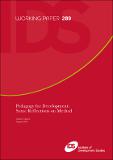Pedagogy for development : some reflections on method
Abstract
An increasing emphasis on learning as engine of change has led to the evolution of
new informal approaches to education. By means of a presentation of a case study
of a rural development project in southern Tajikistan implemented by a local NGO,
this paper discusses the use of discovery-based pedagogical methods for transformative
learning, the goal of which is to create a process to support participants
in developing tools for critical reflective thinking aimed at producing social change.
The project worked with populations recently returned home following a civil war,
bewildered by the collapse of Soviet socialism, and in the throes of a typhoid
epidemic. In relation to this last, a simple intervention helped one village’s
inhabitants reverse the spiral of infection and stop the epidemic in their community.
Gender training with both men and women focusing on deconstructing elements
of gender identities made a significant contribution to producing social change,
especially since we took into consideration age-based power differences, which in
the gerontocratic setting of Tajikistan are essential elements in gender identities.
Transformative learning theories developed in the west by Jack Mezirow and
colleagues are compared with the approach of the NGO in terms of their usefulness
for such projects as the Tajik one, and cultural issues involved in applying
western paradigms to southern education projects are discussed.
The paper concludes that to be most effective, informal education should be carried
out in a culturally sensitive manner responsive to the distinct learning patterns of
specific social groups, including gender-based learning differences. For people to be
able to make real change in practice a critical mass of the population needs to be
incorporated into the project and this also means working with all segments of the
population – girls and boys as well as men and women of different ages.
Keywords: participatory learning, gender identities, gender training, transformative
learning, Tajikistan, pedagogies for development
Citation
Harris, C. (2007) Pedagogy for development : some reflections on method. Working paper series, 289. Brighton: IDS.Is part of series
IDS working papers;289Library catalogue entry
http://bldscat.ids.ac.uk/cgi-bin/koha/opac-detail.pl?biblionumber=169208Rights holder
Institute of Development StudiesCollections
- IDS Research [1671]

